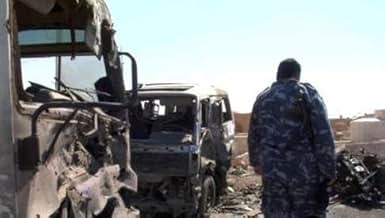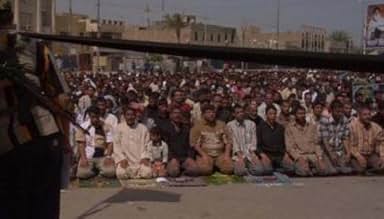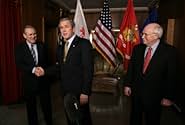AVALIAÇÃO DA IMDb
8,2/10
8,8 mil
SUA AVALIAÇÃO
Adicionar um enredo no seu idiomaA comprehensive look at the Bush Administration's conduct of the Iraq war and its occupation of the country.A comprehensive look at the Bush Administration's conduct of the Iraq war and its occupation of the country.A comprehensive look at the Bush Administration's conduct of the Iraq war and its occupation of the country.
- Indicado a 1 Oscar
- 12 vitórias e 19 indicações no total
Campbell Scott
- Narrator
- (narração)
George Tenet
- Self
- (cenas de arquivo)
Dick Cheney
- Self
- (cenas de arquivo)
Donald Rumsfeld
- Self
- (cenas de arquivo)
Paul Wolfowitz
- Self
- (cenas de arquivo)
Colin Powell
- Self
- (cenas de arquivo)
Feisal Istrabadi
- Self
- (as Faisal Al-Istrabadi)
Ahmad Chalabi
- Self
- (cenas de arquivo)
Avaliações em destaque
10sdv30-1
This is a movie every American must see. Tens of thousands of Iraqis killed, thousands of brave American soldiers killed or maimed, all for no apparent reason than the arrogance of this administration. Many good people, administrators, military etc. speak out in this movie and give a chilling view of the ineptitude and arrogance of George Bush and co. Unfortunately, these people were not consulted in the beginning of the occupation. Instead, they were pushed aside, as clueless and even malevolent bureaucrats, such as Bremmer, Holcombe, Wolfowitz, Rice, Rumsfeld, Cheney and Bush, mangled every aspect of the American occupation, one after the other, causing in the process an unimaginable loss of human life and resources. The movie's creators do not impose their beliefs on you. Instead, they let the testimonies of the people who were there speak for themselves. The conclusion that comes out of it is inescapable. This has been the largest quagmire in American history, the true cost of which will not be known for decades. It truly is a nightmare with no end in sight.
This is an amazing conformation of the Bush administrations utter failure in the handling of the Iraq war. A girl scoot troop could have made better and more informed decisions. Perhaps even a troop of monkeys would have done a better job then Bush's henchmen?
The errors in judgment and lack of military experience within the administration are both appalling and telling of the Bush white house. Every military expert was systematically ignored or sidelined. It's as if the Bush administration's primary and sole interest or concern was the protection and acquisition of Iraq's oil provisions.
This film is a testament to the complete and absolute failure of the Bush presidency.
The errors in judgment and lack of military experience within the administration are both appalling and telling of the Bush white house. Every military expert was systematically ignored or sidelined. It's as if the Bush administration's primary and sole interest or concern was the protection and acquisition of Iraq's oil provisions.
This film is a testament to the complete and absolute failure of the Bush presidency.
In retrospect, I suppose 2007 will go down as the year in which filmmakers began addressing the problems in Iraq. The number of Iraq-themed films has piled up and disappeared at a breathtaking pace. Maybe it's not a surprise that the best of them so far is the one that doesn't try to turn the conflict into something fictional. All of the other Iraq movies have been well intentioned but limp; you can tell they want to address what's wrong without truly enraging anyone. Well, Charles Ferguson, the writer and director of "No End in Sight," has no such qualms, and his film enrages indeed.
Meticulously crafted, "No End in Sight" proves what everyone has already known for a long time: the Iraq conflict is a complete disaster. The film is certainly biased; anyone who wants to discount it based on that fact is welcome to. But anyone who wants to deny that America's handling of post-invasion Iraq has been anything but a complete "quagmire" (to borrow a word from the film) is hopelessly deluded. "No End in Sight" is not about whether or not the war in Iraq was justified; in fact, the film goes out of its way to affirm that at first many Iraqis were happy that the U.S. had deposed Saddam Hussein. Rather, the film is about what went wrong after the invasion, about how groups that actually had a reconstruction plan were met with indifference at every step by an administration that really cared nothing for the Iraqi people even as they fed the American public a lot of hooey about bringing freedom and democracy to them. This film makes clear that for all of its recent talk about dangerous nations destabilizing the world's peace, the United States is one of the most dangerous countries currently in existence.
It's terrifying that governments are run like this; if this film is accurate, my office at work is better managed than the project for occupying post-war Iraq. Ferguson can't be blamed if his film seems one sided. None of the key decision makers managing Iraq policy -- Cheney, Rumsfeld, Rice, Bremer -- agreed to be interviewed for the film. The only consolation the film offers is that Cheney, Bush and Rumsfeld now look like complete fools. Either they thought they had a good plan for rebuilding Iraq and proved themselves to be ridiculously incompetent; or (and more likely) they never really cared about what happened to Iraq in the first place and have proved themselves to be downright scary.
Grade: A
Meticulously crafted, "No End in Sight" proves what everyone has already known for a long time: the Iraq conflict is a complete disaster. The film is certainly biased; anyone who wants to discount it based on that fact is welcome to. But anyone who wants to deny that America's handling of post-invasion Iraq has been anything but a complete "quagmire" (to borrow a word from the film) is hopelessly deluded. "No End in Sight" is not about whether or not the war in Iraq was justified; in fact, the film goes out of its way to affirm that at first many Iraqis were happy that the U.S. had deposed Saddam Hussein. Rather, the film is about what went wrong after the invasion, about how groups that actually had a reconstruction plan were met with indifference at every step by an administration that really cared nothing for the Iraqi people even as they fed the American public a lot of hooey about bringing freedom and democracy to them. This film makes clear that for all of its recent talk about dangerous nations destabilizing the world's peace, the United States is one of the most dangerous countries currently in existence.
It's terrifying that governments are run like this; if this film is accurate, my office at work is better managed than the project for occupying post-war Iraq. Ferguson can't be blamed if his film seems one sided. None of the key decision makers managing Iraq policy -- Cheney, Rumsfeld, Rice, Bremer -- agreed to be interviewed for the film. The only consolation the film offers is that Cheney, Bush and Rumsfeld now look like complete fools. Either they thought they had a good plan for rebuilding Iraq and proved themselves to be ridiculously incompetent; or (and more likely) they never really cared about what happened to Iraq in the first place and have proved themselves to be downright scary.
Grade: A
It cannot be disputed that all that is presented here is factual, being that it consists of interviews and documentary footage. There may be some debate as to the truth of what some of the interviewees say, but the interviews did take place and those being interviewed are clearly identified. The material is edited to conclusively establish that the U.S. Iraq adventure is a monument to incompetence. The fact that most of the interviewees were high ranking officials in the Bush administration lends credence to the point of view.
To those who have diligently tried to follow the events of the Iraq war, this film will confirm suspicions as well as add some new insights as to how we have wound up in the mess we are in. To those who have not paid attention, this film should provide groundwork for further investigation. The film avoids sensationalism - it does not dwell on maimed bodies, casualties, troop morale, and so forth. It does not even cite things like Bush's "Mission Accomplished" speech or Wolfowitz's estimate the the cost of the war would be two billion dollars tops.
It is not surprising that all of the principal players declined to be interviewed, but it would have been good to have had interviews with officials who supported going to war and continue to defend it.
What I was left with after viewing this was a great sadness that after well over a year since this film was released, and after over five years of the war, there is still no end in sight.
To those who have diligently tried to follow the events of the Iraq war, this film will confirm suspicions as well as add some new insights as to how we have wound up in the mess we are in. To those who have not paid attention, this film should provide groundwork for further investigation. The film avoids sensationalism - it does not dwell on maimed bodies, casualties, troop morale, and so forth. It does not even cite things like Bush's "Mission Accomplished" speech or Wolfowitz's estimate the the cost of the war would be two billion dollars tops.
It is not surprising that all of the principal players declined to be interviewed, but it would have been good to have had interviews with officials who supported going to war and continue to defend it.
What I was left with after viewing this was a great sadness that after well over a year since this film was released, and after over five years of the war, there is still no end in sight.
Sometimes seeing a documentary that has such immense and complex connotations like the war on Iraq can be so staggering that one might be tempted to rate it highly just based on how compelling the subject matter is. That part of it, of whether it's worthy for a documentary, is important. But first-time director Ferguson does an incredible job of amounting crucial interviews with former Generals and government officials, ex-soldiers, enough footage of Iraq destruction for two or more movies, and a mounting sense of dread over the unequivocal fiasco that what went on leading up to-during-and especially after America invaded Iraq, and the film was more than worthy of a special jury prize at Sundance earlier this year.
It's devastating and infuriating enough to get the people you might be with seeing the film into a heated argument (probably with everyone on the side, at least, that it was profoundly stupid to go into the country to start with, without a real plan anyway), because of the layers that can be taken into account. If one watched the news enough, or read what was available at the time, then some of the information may not be all new-news. But a lot of it is, which throws on fuel to the fire for Ferguson's thesis that with all the mounting mistakes, the most crucial ones came in taking for granted what would happen if say, for example, the Iraqi army was disbanded along with the Ba'ath party (if that's how it's spelled). Interestingly, Ferguson doesn't spend too much time on the blunder that was going into Iraq in the first place; that's for other films and he knows it well (namely Fahrenheit 9/11).
We went in. Now 'what to do next' is really where the cards are all layed out: the looting and rioting, which went on for days and ruined many of Iraq's small places of civilization like museums and libraries (which, of course, Rumsfeld and the US didn't mind and practically encouraged), then after that the whole huge f*** up that was the lack of real planning for after we toppled Sadaam's regime (for Germany after WW2 the plan was layed out two years in advance, for Iraq it started 50 days before the invasion), and very notably Walter B. Slocombe (who comes off stumbling through his interview as he can't answer why he wasn't talking to other advisers about the plans of what to do with the Iraq security) and L Paul Bremer, who crafted the three plans for reconstituting Iraq, which basically created the Insurgency. That part, of course, is a big chunk of No End in Sight, with the blunders continuing on and gaining force with the US involvement in Iraq.
So the question comes first to those thinking about the questions Ferguson lays out through his interview, aside from how in the living hell (literally, if you're over in Iraq) we've now spend two *trillion* dollars over there, which is: Why? To get a documentary like that now probably would make a big enough uproar to get people in the streets. But for now, No End in Sight will have to do.
It's devastating and infuriating enough to get the people you might be with seeing the film into a heated argument (probably with everyone on the side, at least, that it was profoundly stupid to go into the country to start with, without a real plan anyway), because of the layers that can be taken into account. If one watched the news enough, or read what was available at the time, then some of the information may not be all new-news. But a lot of it is, which throws on fuel to the fire for Ferguson's thesis that with all the mounting mistakes, the most crucial ones came in taking for granted what would happen if say, for example, the Iraqi army was disbanded along with the Ba'ath party (if that's how it's spelled). Interestingly, Ferguson doesn't spend too much time on the blunder that was going into Iraq in the first place; that's for other films and he knows it well (namely Fahrenheit 9/11).
We went in. Now 'what to do next' is really where the cards are all layed out: the looting and rioting, which went on for days and ruined many of Iraq's small places of civilization like museums and libraries (which, of course, Rumsfeld and the US didn't mind and practically encouraged), then after that the whole huge f*** up that was the lack of real planning for after we toppled Sadaam's regime (for Germany after WW2 the plan was layed out two years in advance, for Iraq it started 50 days before the invasion), and very notably Walter B. Slocombe (who comes off stumbling through his interview as he can't answer why he wasn't talking to other advisers about the plans of what to do with the Iraq security) and L Paul Bremer, who crafted the three plans for reconstituting Iraq, which basically created the Insurgency. That part, of course, is a big chunk of No End in Sight, with the blunders continuing on and gaining force with the US involvement in Iraq.
So the question comes first to those thinking about the questions Ferguson lays out through his interview, aside from how in the living hell (literally, if you're over in Iraq) we've now spend two *trillion* dollars over there, which is: Why? To get a documentary like that now probably would make a big enough uproar to get people in the streets. But for now, No End in Sight will have to do.
Você sabia?
- CuriosidadesMarine Lieutenant Seth Moulton was elected the US Congressman for Massachusetts' 6th District in November 2014.
- Citações
Seth Moulton: Are you telling me that's the best America can do?... No, don't tell me that... That makes me angry.
Principais escolhas
Faça login para avaliar e ver a lista de recomendações personalizadas
Everything New on HBO Max in September
Everything New on HBO Max in September
We're excited for "Task," a new crime series from the creator of "Mare of Easttown." See everything else coming to HBO Max this month.
- How long is No End in Sight?Fornecido pela Alexa
Detalhes
Bilheteria
- Orçamento
- US$ 2.000.000 (estimativa)
- Faturamento bruto nos EUA e Canadá
- US$ 1.433.319
- Fim de semana de estreia nos EUA e Canadá
- US$ 31.533
- 29 de jul. de 2007
- Faturamento bruto mundial
- US$ 1.433.319
- Tempo de duração
- 1 h 42 min(102 min)
- Cor
- Mixagem de som
- Proporção
- 1.85 : 1
Contribua para esta página
Sugerir uma alteração ou adicionar conteúdo ausente































